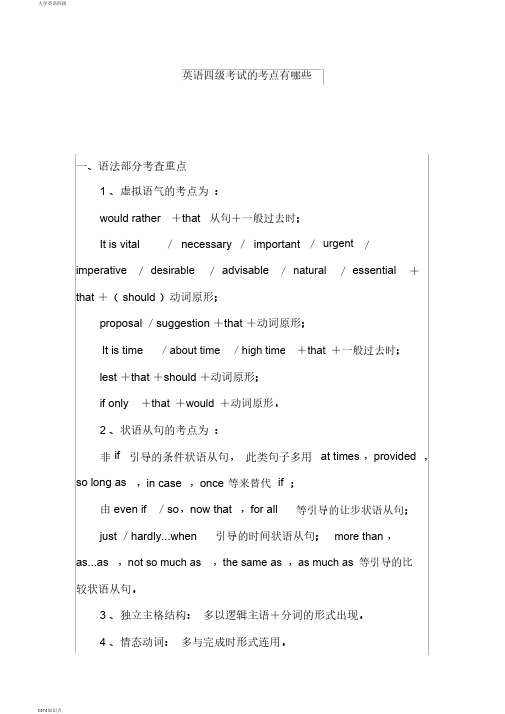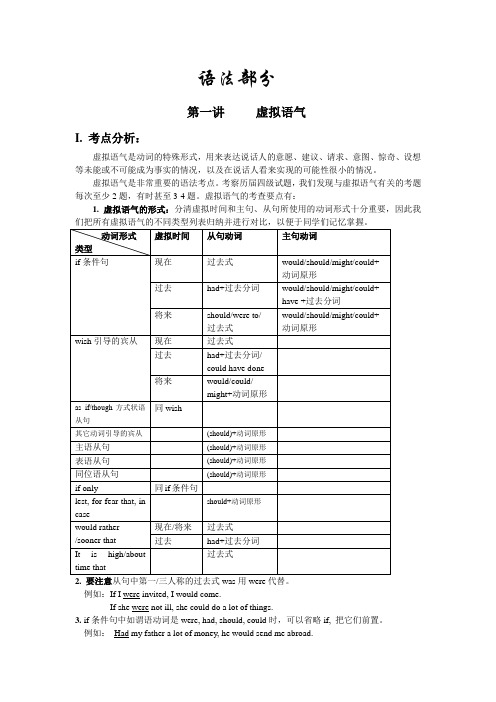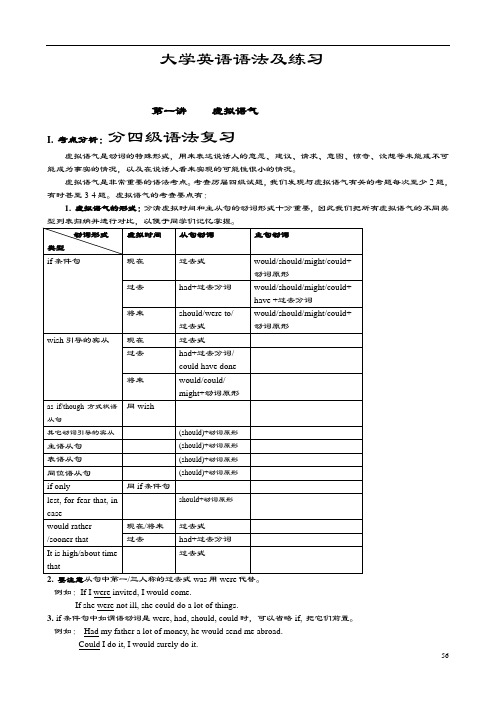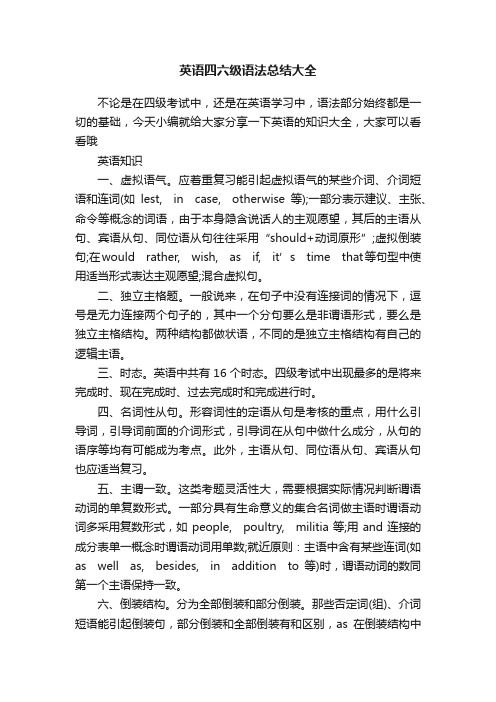四级语法细说虚拟语气
大学英语四级考试的考点有哪些知识点汇总

英语四级考试的考点有哪些一、语法部分考查重点1 、虚拟语气的考点为:would rather+that从句+一般过去时;It is vital/necessary/important/urgent /imperative /desirable /advisable /natural /essential +that +( should )动词原形;proposal /suggestion +that +动词原形;It is time/about time/high time+that+一般过去时;lest +that +should +动词原形;if only+that+would+动词原形。
2 、状语从句的考点为:非if 引导的条件状语从句,此类句子多用at times ,provided ,so long as ,in case ,once 等来替代if ;由 even if /so,now that ,for all 等引导的让步状语从句;just /hardly...when引导的时间状语从句;more than ,as...as,not so much as,the same as,as much as等引导的比较状语从句。
3 、独立主格结构:多以逻辑主语+分词的形式出现。
4 、情态动词:多与完成时形式连用。
5、定语从句:重点考查介词+关系代词(which)和 as 作为关系代词。
二、词汇部分考查重点1、动词、名词与介词的搭配如: popular /patient +with ;yield /s olution /adapt /transfer /access +to ;accuse/require +of ;charge +for ;under +discussion等等。
2、习惯用法如: confess to /set about /be used to +doing ;be supposed to /have/make sb.+ do 等。
专四语法 可可英语

专四语法可可英语好的,以下是一篇有关可可英语专四语法的文章:可可英语专四语法精讲一、虚拟语气虚拟语气是英语语法中一个非常重要的部分,在专四考试中也是必考的知识点。
虚拟语气用来表示与实际情况相反的情况或者表达主观上的愿望、建议、猜测等。
虚拟语气的用法包括与现在事实相反、与过去事实相反和与将来事实相反三种情况。
1. 与现在事实相反:使用动词的过去式(be动词用were),从句使用would+动词原形。
例如:If I were you,I would choose to study abroad.(如果我是你,我会选择出国留学。
)2. 与过去事实相反:使用“would+have+过去分词”,从句使用“had+过去分词”。
例如:If we had known the answer,we would have told you.(如果我们知道答案,我们早就告诉你了。
)3. 与将来事实相反:使用“would+动词原形”,从句使用“were+to+动词原形”或者“should+动词原形”。
例如:If it were to rain tomorrow,the football match would be postponed.(如果明天下雨,足球比赛就会被推迟。
)二、定语从句定语从句是英语语法中的另一个重要知识点,也是专四考试的重点。
定语从句用来修饰名词,通常放在所修饰名词之后。
引导定语从句的关联词包括that、which、who、whose等。
1. 使用that的情况:当先行词为all、something、nothing、this等不定代词时,或者先行词被形容词最高级修饰时,多用that引导定语从句。
例如:This is the most interesting book that I have ever read.(这是我读过的最有趣的书。
)2. 使用which的情况:当引导词前面有逗号或放在句末时,通常使用which。
四级短对话真题里的虚拟语气

四级短对话真题里的虚拟语气——循序而渐进,熟读而精思。
《中华圣贤经》,山湖纪人,海天出版社,2006,P58【注】① 2002年6月至2011年12月,音频位置以新东方版本为标准;2012年6月至2014年6月,以星火版本为标准; 2012年6月至2014年6月,以星火版本为标准。
②五号字,行间距20磅,上下左右页边距2.1时,页面显示更整齐。
♣6.【5:40】A) Pamela’s report is not finished as scheduled.B) Pamela has a habit of doing things in a hurry.C) Pamela is not good at writing research papers.D) Pamela’s mistakes could have been avoided.6.【5:40】M: I’ve heard that Pamela made quite a few mistakes in her lab report.W: Well, she wouldn’t have if she hadn’t been in such a hurry to get it done.Q: What does the woman imply?【D. Pamela’s mistakes could have been avoided.】【注意四级听力重复出现的人名:2003年9月Passage One,音频位置新东方版8:01~9:50】Pamela Royal and her partner, Edith Clark, are the owners of the Sea View Hotel in Brighton.♣2.【2:01】A) Take the ring to the administration building. C) Wait for the owner of the ring in the restroom.B) Give the ring to a policeman. D) Hand in the ring to the security office.2.【2:01】W: I found an expensive diamond ring in the restroom this morning.M: If I were you, I’d turn it into the security office. It is behind the administration building.Q: What does the man suggest the woman do? 【D. Hand in the ring to the security office.】♣8【6:31】A) Priority should be given to listening.B) It’s most helpful to read English newspapers every day.C) It’s more effective to combine listening with reading.D) Reading should come before listening.8.【6:31】W: In my opinion, watching the news on TV is a good way to learn English. What do you think?M: It would be better if you could check the same information in English newspapers afterwards.Q: What does the man say about learning English?【C. It’s more effective to combine listening with reading.】♣13.【2:27】A) Teaching her son by herself.C) Asking the teacher for extra help.B) Having confidence in her son.D) Telling her son not to worry.13.【2:27】W: What would you do if you were in my place?M: If Paul were my son, I’d just not worry. Now that his teacher is giving him extra help and he's working hard himself, he’s sure to do well in the next exam.Q: What’s the man’s suggestion to the woman? 【B. Having confidence in her son.】♣18.【4:53】A) A computer game. C) An exciting experience.B) An imaginary situation. D) A vacation by the sea.18.【4:53】M: Jane, suppose you lost all your money while taking a vacation overseas, what would you do?W: Well, I guess I'd sell my watch or computer or do some odd jobs till I could afford a return plane ticket.Q: What are the speakers talking about? 【B. An imaginary situation.】♣17.【4:42】A) Few students understand Prof. Johnson's lectures.B) Few students meet Prof. Jonson's requirements.C) Many students find Prof. Johnson's lectures boring.D) Many students have dropped Prof. Johnson's class.17.【4:42】W: You’re taking a course with Professor Johnson. What’s your impression so far?M: Well, many students could hardly stay awake in his class without first drinking a cup of coffee.Q: What does the man imply?【C. Many students find Prof. Johnson's lectures boring.】♣5.【3:02】A) He doesn’t get on w ith the others. C) He has been taken for a fool.B) He doesn’t feel at ea se in the firm. D) He has found a better position.5.【3:02】W: Rod, I hear you’ll be leaving at the end of this month. Is it true?M: Yeah. I’ve been offered a much better position with another firm. I’d be a fool to turn it down.Q: Why is the man quitting his job? 【D. He has found a better position.】♣12.【1:39】A) She will drive the man to the supermarket.B) The man should buy a car of his own.C) The man needn't go shopping every week.D) She can pick the man up at the grocery store.12.【1:39】M: Do you think I could borrow your car to go grocery shopping? The supermarkets outside the cityare so much cheaper. I’d also be happy to pick up anything you need.W: Well, I don’t like to let anyone else drive my car. Tell you what, why don’t we go together?Q: What does the woman mean? 【A. She will drive the man to the supermarket.】♣11.【0:58】A) The man should visit the museums. C) The beach resort is a good choice.B) She can’t stand the hot weather. D) She enjoys staying in Washington.11.【0:58】M: Oh my God! The heat is simply unbearable here! I wish we’d gone to the beach instead.W: Wow, with the museums and restaurants in Washington, I’d be happy here no matter what the temperature.Q: What does the woman mean? 【D. She enjoys staying in Washington.】♣13.【2:25】A) The man can speak a foreign language.B) The woman hopes to improve her English.C) The woman knows many different languages.D) The man wishes to visit many more countries.13.【2:25】W: Having visited so many countries, you must be able to speak several different languages.M: I wish I could. But Japanese and, of course, English are the only languages I can speak.Q: What do we learn from the conversation? 【A. The man can speak a foreign language.】♣13.【2:21】A) The man regrets being absent-minded. C) The man placed the reading list on a desk.B) The woman saved the man some trouble. D) The woman emptied the waste paper basket.13.【2:21】M: I wish I hadn’t thrown away that reading list!W: I thought you might regret it. That’s why I picked it up from the waste paper basket and left it on the desk.Q: What do we learn from the conversation? 【B. The woman saved the man some trouble.】♣12.【1:32】A) Her new responsibilities in the company. C) What the customers’ feedback is.B) What her job prospects are. D) The director’s opinion of her work.12.【1:32】M: How’s the new job going?W: Well, I’m learni ng a lot of new things, but I wish the director would give me some feedback.Q: What does the woman want to know? 【D. The director’s opinion of her work.】♣12.【1:29】A) Jane may be caught in a traffic jam. C) He knows what sort of person Jane is.B) Jane should have started a little earlier. D) He is irritated at having to wait for Jane.12. 【1:29】W: I wish Jane would call when she knows she'll be late. This is not the first time we've had to waitfor her.M: I agree. But she does have to drive through very heavy traffic to get here.Q: What does the man imply? 【A. Jane may be caught in a traffic jam.】♣12.【1:28】A) He was looking forward to seeing the giraffes.B) He enjoyed watching the animal performance.C) He got home too late to see the TV special.D) He fell asleep in the middle of the TV program.12.【1:28】W: I really enjoyed the TV special about giraffes长颈鹿last night. Did you get home in time to see it?M: Oh, yes, but I wish I could have stayed awake long enough to see the whole thing.Q: What does the man mean? 【D. He fell asleep in the middle of the TV program.】♣3.【2:38】A) It’s quiet in the restaurant. C) The restaurant serves good food.B) The price is high in the restaurant. D) The restaurant is too far from their school.3.【2:38】M: The food in this restaurant is horrible. If only we’d gone to the school dining hall.W: But the food isn't everything. Isn't it nice just to get away from all the noise?Q: What can we learn from the conversation? 【A. It’s quiet in the restaurant.】♣1.【1:02】A) They went a long way to attend the party.B) They didn’t think much of the food and drinks.C) They knew none of the other guests at the party.D) They enjoyed the party better than the other guests.1.【1:02】M: I think the hostess really went out of her way to make the party a success.W: Yes, the food and drinks were great, but if only we had known a few of the other guests.Q: What did the two speakers say about the party?【C. They knew none of the other guests at the party.】♣6.【5:34】A) Sam has a big family to support. C) The pay offered by the travel agency is too low.B) Sam is not interested in traveling. D) The work hours in the travel agency arc too long. 6【5:34】W: So you know that Sam turns down the job offered by the travel agency.M: Yes. The hours were convenient. But if he had accepted it, he wouldn’t be able to make ends meet.Q: What do we learn from the conversation? 【C. The pay offer by the travel agency is too low.】♣5.【05:00】A. It is more comfortable and convenient to take a bus.B. It is worth the money taking a train to Miami.C. It is not always cheaper going by bus.D. It is faster to go to Miami by bus.5.【05:00】W: Taking a bus to Miami is cheaper than going by train.M: That’s true. But I’d rather pay a little more for the added comfort and convenience.Q: What does the man mean?【B. It is worth the money taking a train to Miami.】♣1.【2:57】A) The woman is now working in a kindergarten.B) The man will soon start a business of his own.C) The man would like to be a high school teacher.D) The woman is going to major in child education.1【2:57】M: After high school, I’d like to go to college and major in business administration.W: But I’d rather spend my college days finding out how children learn.Q: What do we learn from the conversation?【D. The woman is going to major in child education.】♣16.【4:05】A) She will meet the man halfway.C) She will ask David to talk less.B) She is sorry the man will not come.D) She has to invite David to the party.16.【4:05】M: I really can’t stand the way David controls the conversation all the time. If he’s going to be at yourChristmas party, I just won’t come.W: I’m sorry you feel that way, but my mother insists that he come. 【=…he should come.】Q: What does the woman imply? 【D. She has to invite David to the party.】4前面的词以辅音结尾,后面的词由于弱读或读音省略,从而产生辅+元的连读。
大学英语语法精讲【重点、考点全涵盖】

语法部分第一讲虚拟语气I. 考点分析:虚拟语气是动词的特殊形式,用来表达说话人的意愿、建议、请求、意图、惊奇、设想等未能或不可能成为事实的情况,以及在说话人看来实现的可能性很小的情况。
虚拟语气是非常重要的语法考点。
考察历届四级试题,我们发现与虚拟语气有关的考题每次至少2题,有时甚至3-4题。
虚拟语气的考查要点有:1. 虚拟语气的形式:分清虚拟时间和主句、从句所使用的动词形式十分重要,因此我2. 要注意从句中第一/三人称的过去式was用were代替。
例如:If I were invited, I would come.If she were not ill, she could do a lot of things.3. if条件句中如谓语动词是were, had, should, could时,可以省略if, 把它们前置。
例如:Had my father a lot of money, he would send me abroad.Could I do it, I would surely do it.Should the Black Death reappear, what should we do?(万一黑死病再次出现,我们该怎么办?)4. 错综时间的条件句是难点,如99年1月第60题: If I hadn’t stood under the ladder to catch you when you fell, you wouldn’t be smiling now.(从句用过去完成时,主句用现在进行时)又如:If I were you, I would have gone to the film last night.(从句虚拟现在,主句虚拟过去);If we hadn’t got everything ready by now, we should be having a terrible time tomorrow.(从句虚拟过去,主句虚拟将来);If the weather had been more favorable, the crops would be growing still better.(从句虚拟过去,主句虚拟现在)5. 虚拟句的另一难点是省略if条件句的含蓄条件句,如:I would have written the paper before, but I have been ill.(=If I had not been ill, I would have written the paper before.);A true friend would have acted differently. (=A friend, if he had been true, would have acted differently.)6. 注意介词短语without, but for, in the absence等表示虚拟条件。
大学英语语法及练习

大学英语语法及练习第一讲虚拟语气I. 考点分析:分四级语法复习虚拟语气是动词的特殊形式,用来表达说话人的意愿、建议、请求、意图、惊奇、设想等未能或不可能成为事实的情况,以及在说话人看来实现的可能性很小的情况。
虚拟语气是非常重要的语法考点。
考查历届四级试题,我们发现与虚拟语气有关的考题每次至少2题,有时甚至3-4题。
虚拟语气的考查要点有:1. 虚拟语气的形式:分清虚拟时间和主从句的动词形式十分重要,因此我们把所有虚拟语气的不同类型列表归纳并进行对比,以便于同学们记忆掌握。
2. 要注意从句中第一/三人称的过去式was用were代替。
例如:If I were invited, I would come.If she were not ill, she could do a lot of things.3. if条件句中如谓语动词是were, had, should, could时,可以省略if, 把它们前置。
例如:Had my father a lot of money, he would send me abroad.Could I do it, I would surely do it.Should the Black Death reappear, what should we do?(万一黑死病再次出现,我们该怎么办?)4. 错综时间的条件句是难点,如99年1月第60题: If I hadn’t stood under the ladder to catch you when you fell, you wouldn’t be smiling now.(从句用过去完成时,主句用现在进行时)又如:If I were you, I would have gone to the film last night.(从句虚拟现在,主句虚拟过去);If we hadn’t got everything ready by now, we should be having a terrible time tomorrow.(从句虚拟过去,主句虚拟将来);If the weather had been more favorable, the crops would be growing still better.(从句虚拟过去,主句虚拟现在) 5. 虚拟句的另一难点是省略if条件句的含蓄条件句,如:I would have written the paper before, but I have been ill.(=If I had not been ill, I would have written the paper before.);A true friend would have acted differently. (=A friend, if he had been true, would have acted differently.)6. 注意介词短语without, but for, in the absence等表示虚拟条件。
英语四六级语法总结大全

英语四六级语法总结大全不论是在四级考试中,还是在英语学习中,语法部分始终都是一切的基础,今天小编就给大家分享一下英语的知识大全,大家可以看看哦英语知识一、虚拟语气。
应着重复习能引起虚拟语气的某些介词、介词短语和连词(如lest, in case, otherwise等);一部分表示建议、主张、命令等概念的词语,由于本身隐含说话人的主观愿望,其后的主语从句、宾语从句、同位语从句往往采用“should+动词原形”;虚拟倒装句;在would rather, wish, as if, it’s time that等句型中使用适当形式表达主观愿望;混合虚拟句。
二、独立主格题。
一般说来,在句子中没有连接词的情况下,逗号是无力连接两个句子的,其中一个分句要么是非谓语形式,要么是独立主格结构。
两种结构都做状语,不同的是独立主格结构有自己的逻辑主语。
三、时态。
英语中共有16个时态。
四级考试中出现最多的是将来完成时、现在完成时、过去完成时和完成进行时。
四、名词性从句。
形容词性的定语从句是考核的重点,用什么引导词,引导词前面的介词形式,引导词在从句中做什么成分,从句的语序等均有可能成为考点。
此外,主语从句、同位语从句、宾语从句也应适当复习。
五、主谓一致。
这类考题灵活性大,需要根据实际情况判断谓语动词的单复数形式。
一部分具有生命意义的集合名词做主语时谓语动词多采用复数形式,如people, poultry, militia等;用and连接的成分表单一概念时谓语动词用单数;就近原则:主语中含有某些连词(如as well as, besides, in addition to等)时,谓语动词的数同第一个主语保持一致。
六、倒装结构。
分为全部倒装和部分倒装。
那些否定词(组)、介词短语能引起倒装句,部分倒装和全部倒装有和区别,as在倒装结构中的用法及意义等等,都是考生应当重视的地方。
七、非谓语动词。
①根据非谓语动词同其所修饰的名词或逻辑主语的一致关系,确定使用主动语态或被动语态,然后考虑采用现在分词、现在分词被动式或过去分词;②非谓语动词同主句谓语动词动作发生的先后关系。
英语四级语法知识的归纳
英语四级语法知识的归纳每年参加四级考试的同学的很多,那么关于英语四级的语法你又掌握了多少呢?下面由为大家整理的英语四级语法的相关资料,希望大家喜欢!英语四级语法一,虚拟语气应着重复习能引起虚拟语气的某些介词、介词短语和连词(如lest, in case, otherwise等);一部分表示建议、主张、命令等概念的词语,由于本身隐含说话人的主观愿望,其后的主语从句、宾语从句、同位语从句往往采用“should+动词原形”;虚拟倒装句;在would rather, wish, as if, it’s time that等句型中使用适当形式表达主观愿望;混合虚拟句。
英语四级语法二,独立主格题一般说来,在句子中没有连接词的情况下,逗号是无力连接两个句子的,其中一个分句要么是非谓语形式,要么是独立主格结构。
两种结构都做状语,不同的是独立主格结构有自己的逻辑主语。
英语四级语法三,时态英语中共有16个时态。
四级考试中出现最多的是将来完成时、现在完成时、过去完成时和完成进行时。
英语四级语法四,名词性从句形容词性的定语从句是考核的重点,用什么引导词,引导词前面的介词形式,引导词在从句中做什么成分,从句的语序等均有可能成为考点。
此外,主语从句、同位语从句、宾语从句也应适当复习。
英语四级语法五,主谓一致这类考题灵活性大,需要根据实际情况判断谓语动词的单复数形式。
一部分具有生命意义的集合名词做主语时谓语动词多采用复数形式,如people, poultry, militia等;用and连接的成分表单一概念时谓语动词用单数;就近原则:主语中含有某些连词(如as well as, besides, in addition to等)时,谓语动词的数同第一个主语保持一致。
英语四级语法六,倒装结构分为全部倒装和部分倒装。
那些否定词(组)、介词短语能引起倒装句,部分倒装和全部倒装有和区别,as在倒装结构中的用法及意义等等,都是考生应当重视的地方。
2020年上半年大学英语四级语法之虚拟语气4篇
【导语】你想有拥有你没有过的能⼒,就要去做⾃⼰没有做过的努⼒。
以下为“2020年上半年⼤学英语四级语法之虚拟语⽓4篇”,欢迎阅读参考!更多相关讯息请关注!【篇⼀】2020年上半年⼤学英语四级语法之虚拟语⽓ 表⽰现在/过去/将来情况的虚拟条件句 虚拟条件句主要有三种结构: 1) 表⽰与现在情况相反:主句谓语⽤“would / could / might +动词原形”,从句谓语⽤“动词的⼀般过去时”(动词be的过去式⼀律⽤were)。
If I were you, I would not accept his offer. If I had time, I would certainly go to the cinema with you. 2) 表⽰与过去情况相反:主句谓语⽤“would / could / might + have +过去分词”,从句谓语⽤过去完成时。
If I had got up a little earlier, I wouldn’t have missed the train. If I had been more careful, I might have passed that exam. 3) 表⽰与将来情况相反:主句谓语⽤“would / could / might +动词原形”,从句谓语⽤“were +动词不定式”或“should +动词原形”。
If I were to do the job, I would not be able to have enough time to study. If it should rain tomorrow, I would not go out with you.【篇⼆】2020年上半年⼤学英语四级语法之虚拟语⽓ 虚拟条件句连接词if的省略 如果虚拟条件句的从句中含有were, had, should, could等词时,可以省略连接词if,但这时必须把were, had, should, could等词移到主语前⾯,形成倒装。
英语语法 虚拟语气知识点
虚拟语气1. 表示现在/过去/将来情况的虚拟条件句虚拟条件句主要有三种结构:1)表示与现在情况相反:主句谓语用“would / could / might +动词原形”,从句谓语用“动词的一般过去时”(动词be的过去式一律用were)。
If I were you, I would not accept his offer.If I had time, I would certainly go to the cinema with you.2) 表示与过去情况相反:主句谓语用“would / co uld / might + have +过去分词”,从句谓语用过去完成时。
If I had got up a little earlier, I wouldn’t have missed the train.If I had been more careful, I might have passed that exam.3) 表示与将来情况相反:主句谓语用“would / could / might +动词原形”,从句谓语用“were +动词不定式”或“should +动词原形”。
If I were to do the job, I would not be able to have enough time to study.If it should rain tomorrow, I would not go out with you.2. 虚拟条件句连接词if的省略如果虚拟条件句的从句中含有were, had, should, could等词时,可以省略连接词if,但这时必须把were, had, should, could等词移到主语前面,形成倒装。
这种句型主要用于书面形式。
Were I to do the job, I would finish doing it within two weeks.Had it not been for his help, we couldn’t have arrived there on time.Should it rain tomorrow, I would stay at home.3. wish后宾语从句中的谓语构成动词wish后的宾语从句表示未实现的或不可能实现的愿望,其宾语从句中的谓语动词要用虚拟语气,有以下三种构成形式。
英语语法:虚拟语气归纳整理
虚拟语气一、语气的分类语气概述:语气,跟失态和语态一样,也是动词的一种形式,表明说话者的意图、态度和目的。
英语中有三种语气:陈述语气、祈使语气和虚拟语气。
1.陈述语气:用来陈述事实或提出想法,包括肯定、否定例:Recent pressure at work may account for his behaviour.他的行为也许是最近的工作压力导致的。
2.祈使语气:表明说话人提出请求、命令或劝告等例:Calm down and tell me what happened.冷静点儿,告诉我发生了什么事。
祈使语气也可用在并列句中表示条件Work hard and you will succeed.好好干,你会成功的。
H e quick or you’ll be late.快点儿,否则你会迟到。
3.虚拟语气:表示说话人的一种愿望、建议、请求、命令;有时是一种非真实的假设,与事实不符或相反的情况例:If had seen him yesterday, I would have told him the news.我如果昨天见到他,就会把这个消息告诉他了。
二、虚拟语气的用法(一)虚拟语气在条件句中的应用1.虚拟语气主要用在虚拟条件中,表示根本不存在的情况或可能很小的假设虚拟语气用于if条件句中时,主句和从句谓语动词的形式如下:——与现在事实相反:过去式(be一般用were)should/ would/could/might+动词原形——与过去事实相反:had+过去分词should/ would/ could/ might have +过去分词——与将来事实相反:过去式(be一般用were)/should + 动词原形/ were to + 动词原形should/ would/ could/might + 动词原形例:If I had enough money, I would buy myself a computer.我如果有足够的钱,会为自己买一台电脑。
- 1、下载文档前请自行甄别文档内容的完整性,平台不提供额外的编辑、内容补充、找答案等附加服务。
- 2、"仅部分预览"的文档,不可在线预览部分如存在完整性等问题,可反馈申请退款(可完整预览的文档不适用该条件!)。
- 3、如文档侵犯您的权益,请联系客服反馈,我们会尽快为您处理(人工客服工作时间:9:00-18:30)。
1 专业四级语法考点细说 I. 虚拟语气 1. if 条件句当中,主从句都使用相应的虚拟形式。当if被省略时,从句当中的虚拟形式had, were, should 要提到从句的主语前面, 构成倒装。 例: Were I you, I would take an umbrella with me. Should I have time, I would call her. Had the damage been worse, the insurance company would have paid more. 2. 主从句的时间背景不一样。或者所表示的是与过去事实相反的假设。 例: If I had hurried, I would be on the train now. We would have dropped by if we had had time. I wouldn’t have known what these were for if I hadn’t been told. 3. It is (high, about, the) time that…….“早该做某事而已经有些晚了” 例: It’s high time that we finished all the tasks. It’s the time the children learned how to behave properly. 4. if 引导让步状语从句,从句当中可以用虚拟语气。“即使,就算”。还有表示让步的一些表达法much as “尽管,虽然”,granted that “即使” 例: We won’t change out plan if the rumor be true. Much as I would have liked to, I couldn’t lend him the money because I simply didn’t have that much spare cash. Granted that you had been drunk, there is no excuse for you to do that. 5. 与将来相反的虚拟的三种形式。 例: If it were to snow tomorrow, I should/would stay at home. (下雪的可能性较小) If it snowed snow tomorrow, I should/would stay at home. (最常用的) If it should snow tomorrow, I should/would stay at home. (下雪的可能性较大) 6. should 加动词原形,should 可以省略的用法。 1) 与以下动词有关的 ask , advise, argue, beg, command. Consent, demand, desire, determine, decide, deserve, expect, insist, intend, maintain, move, order prefer, propose, recommend, request, require, resolve, suggest, urge, vote. A) 宾语从句 B) 部分上述动词的名词形式的同位语从句,表语从句 (另necessity, pray, preference, plan, idea) C) 主语从句(另 It is arranged that……) 例: In the past, men generally preferred that their wives work in the 2
home. This is their resolution that extra-curriculum activities be made part of their school life. His suggestion was that we (should) take notes while listening to the lecture. It was arranged that they (should) leave the following week. 2) 形容词的关系从句。 Advisable, adamant(坚定不移的), appropriate, better, desirable, essential, imperative, important, insistent, incredible, been, natural, necessary, obligatory, possible, preferable, probable, strange, urgent, vital. 例: It is desirable that the agreement be signed before May. (主语从句) I don’t think it advisable that he (should) be assigned to the job since he has no experience at all. (真正宾语从句) 3) It is a pity/shame/no wonder/one’s wish + that 句型。表示主观结果。 例: It is a great pity that he should be so conceited 他那么狂妄,真是可悲。 4) Lest, in case, for fear that “以免” 这些词引导的目的状语从句。 例: You should not go out alone in the dark lest you should be killed. Take your umbrella in case it should rain. 7. 由表示假设的连词、介词所构成的短语或从句做状语, 主句或从句用should/would/could/might +v. 或should/ would/could/ might +have done. 这些词有: but for , but that, on condition that, supposing, provided, providing, unless, without, whether. 例: But for your help, I wouldn’t have finished the work. The juvenile offender was released form custody on condition that he should find a job immediately. Providing you had the opportunity to go abroad, where would you go? Whether she be right or wrong, she will have my unswerving support. 8. as though /as if 表示假设。 例: Alan talks as if he knew everything. (当时的假设) He spoke as though nothing had happened. (过去的假设) Some days go by much more quickly than others, some hours seem as if they would never end. (将来的假设) 9. wish, if only, had hoped (本来希望) , would rather, had rather, would sooner, would as soon 等之后的从句用过去式,过去完成时或would加动词原形。 例: I wish that I had more money. Bob wishes that he had bought that house last spring. 3
If he only knew how we miss him. His father had hoped that he would go into business. I’d rather you didn’t do anything about it for the time being., I’d sooner they didn’t deliver the new furniture tomorrow.
II. 从句 1. than引导的方式状语从句的省略。 例: Don’t eat more than is good for you. No leader of a party has kept himself in greater detachment form the sentiment of his than has the late Prime Minister. She eats less than a bird. I love him more than her. The box is bigger than I wanted. There was nothing he desired more than to see the matter end. He thinks that driving himself is safer than letting me drive. 2. as 引导的方式状语从句的几种情况。 1) “以…的方式,如同……那样” 2) “像…….一样” 3) as……as…… “……而……” 例: They hunted him as a tiger stalks his prey. 他们象老虎追踪猎物一样去搜捕他. He is as brave as wise. = He is as brave as he is wise. He was as experienced as his brother was green. 他经验丰富而他的兄弟却涉世未深. 3. as 的几种搭配词组 1) as much as “达到与……一样的程度” 2) not…so much as/not so much ….as “与其说是….倒不如说是” 3) not so much as “甚至连……都不” 例: Language belongs to each member of the society, to the cleaner as much as to the professor. He is not a politician so much as a common rogue.与其说他是一个政客,倒不如说他是一个普通的流氓. She can not so much as write her own name. 她甚至连自己的名字都不会写. 4. 句型A is to B what C is to D “A之于B就像C之于D” 例: Water is to fish what air is to man. Twelve is to three what four is to one. 5. 句型 not……any more than “…和…同样都不…” no more /less than “ 只不过/不亚于”
